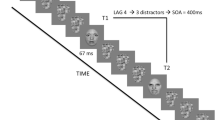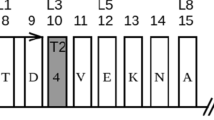Abstract
Previous meditation-related studies included considerably more women than men, potentially concealing gender differences in attention training effects. Here, we present a study exploring potential gender differences in short-term meditation training (MT) effects on performance in an attentional blink (AB) task with a balanced sampling of men and women. A total of 165 college students were randomized into three groups: MT, video game training (VGT), and control (CON). Participants completed a series of pre-intervention assessments, including the Five-Facet Mindfulness Questionnaire (FFMQ), the State-Trait Anxiety Inventory (S-TAI), and self-reported mood, arousal level, and daily time spent playing video games. Participants then completed MT, completed VGT, or had no intervention (CON group). The MT and VGT sessions consisted of 4 days of 20 min of training per day. After training, participants re-rated their arousal state and emotional state, and then performed the AB task. Relative to the CON group, the MT or VGT groups showed a significantly reduced AB. Interestingly, regarding effects on AB performance, MT was more effective in women, whereas VGT was more effective in men. MT, but not VGT, decreased anxiety scores from before to after the intervention. The current results indicate that gender plays an important role in the benefits of attention training, and thus that clinicians should take gender into consideration when implementing meditation-based therapies.




Similar content being viewed by others
Data Availability
The datasets generated and/or analyzed during the current study are available from the corresponding author upon reasonable request.
References
Chun, M. M., & Potter, M. C. (1995). A two-stage model for multiple target detection in rapid serial visual presentation. Journal of Experimental Psychology: Human Perception and Performance, 21(1), 109–127.
Colzato, L. S., Sellaro, R., Samara, I., Baas, M., & Hommel, B. (2015). Meditation-induced states predict attentional control over time. Consciousness and Cognition, 37, 57–62. https://doi.org/10.1016/j.concog.2015.08.006.
Davidson, R. J., & Kaszniak, A. W. (2015). Conceptual and methodological issues in research on mindfulness and meditation. American Psychologist, 70(7), 581–592. https://doi.org/10.1037/a0039512.
Deng, Y.-Q., Liu, X.-H., Rodriguez, M. A., & Xia, C.-Y. (2011). The five facet mindfulness questionnaire: Psychometric properties of the Chinese version. Mindfulness, 2(2), 123–128. https://doi.org/10.1007/s12671-011-0050-9.
Fabio, R. A., & Towey, G. E. (2018). Long-term meditation: The relationship between cognitive processes, thinking styles and mindfulness. Cognitive Processing, 19(1), 73–85. https://doi.org/10.1007/s10339-017-0844-3.
Faul, F., Erdfelder, E., Lang, A. G., & Buchner, A. (2007). G*power 3: A flexible statistical power analysis program for the social, behavioral, and biomedical sciences. Behavior Research Methods, 39(2), 175–191. https://doi.org/10.3758/bf03193146.
Garrison, K. A., Santoyo, J. F., Davis, J. H., Thornhill IV, T. A., Kerr, C. E., & Brewer, J. A. (2013). Effortless awareness: Using real time neurofeedback to investigate correlates of posterior cingulate cortex activity in meditators' self-report. Frontiers in Human Neuroscience, 7, 440. https://doi.org/10.3389/fnhum.2013.00440.
Green, C. S., & Bavelier, D. (2003). Action video game modifies visual selective attention. Nature, 423(29), 534–537.
Hasenkamp, W., Wilson-Mendenhall, C. D., Duncan, E., & Barsalou, L. W. (2012). Mind wandering and attention during focused meditation: A fine-grained temporal analysis of fluctuating cognitive states. Neuroimage, 59(1), 750–760. https://doi.org/10.1016/j.neuroimage.2011.07.008.
Kang, Y., Rahrig, H., Eichel, K., Niles, H. F., Rocha, T., Lepp, N. E., Gold, J., & Britton, W. B. (2018). Gender differences in response to a school-based mindfulness training intervention for early adolescents. Journal of School Psychology, 68, 163–176.
Katz, D., & Toner, B. (2012). A systematic review of gender differences in the effectiveness of mindfulness-based treatments for substance use disorders. Mindfulness, 4(4), 318–331. https://doi.org/10.1007/s12671-012-0132-3.
Liu, X., Xu, W., Wang, Y., Williams, J. M., Geng, Y., Zhang, Q., et al. (2015). Can inner peace be improved by mindfulness training: A randomized controlled trial. Stress and Health, 31, 245–254. https://doi.org/10.1002/smi.2551.
Lorenz, R. C., Gleich, T., Gallinat, J., & Kuhn, S. (2015). Video game training and the reward system. Frontiers in Human Neuroscience, 9, 40. https://doi.org/10.3389/fnhum.2015.00040.
Lucas, K., & Sherry, J. L. (2016). Sex differences in video game play. Communication Research, 31(5), 499–523. https://doi.org/10.1177/0093650204267930.
Lutz, A., Slagter, H. A., Dunne, J. D., & Davidson, R. J. (2008). Attention regulation and monitoring in meditation. Trends in Cognitive Sciences, 12(4), 163–169. https://doi.org/10.1016/j.tics.2008.01.005.
Malinowski, P. (2013). Neural mechanisms of attentional control in mindfulness meditation. Frontiers in Neuroscience, 7, 8. https://doi.org/10.3389/fnins.2013.00008.
Martens, S., & Wyble, B. (2010). The attentional blink: Past, present, and future of a blind spot in perceptual awareness. Neuroscience and Behavioral Reviews, 34, 947–957. https://doi.org/10.1016/j.neubiorev.2009.12.005.
Moore, A., & Malinowski, P. (2009). Meditation, mindfulness, and cognitive flexibility. Consciousness and Cognition, 18(1), 176–186.
Nakatani, C., Baijal, S., & van Leeuwen, C. (2009). Practice begets the second target: Task repetition and the attentional blink effect. Progress in Brain Research, 176, 123–134. https://doi.org/10.1016/s0079-6123(09)17608-2.
Pattyn, E., Verhaeghe, M., & Bracke, P. (2015). The gender gap in mental health service use. Social Psychiatry and Psychiatric Epidemiology, 50(7), 1089–1095. https://doi.org/10.1007/s00127-015-1038-x.
Raymond, J. E., Shapiro, K. L., & Arnell, K. M. (1992). Temporary suppression of visual processing in an RSVP task: An attentional blink? Journal of Experimental Psychology: Human Perception and Performance, 18(3), 849–860.
Roca, P., & Vazquez, C. (2020). Brief meditation trainings improve performance in the emotional attentional blink. Mindfulness, 11(7), 1613–1622. https://doi.org/10.1007/s12671-020-01374-x.
Rojiani, R., Santoyo, J. F., Rahrig, H., Roth, H. D., & Britton, W. B. (2017). Women benefit more than men in response to college-based meditation training. Frontiers in Psychology, 8, 551. https://doi.org/10.3389/fpsyg.2017.00551.
Sedlmeier, P., Eberth, J., Schwarz, M., Zimmermann, D., Haarig, F., Jaeger, S., & Kunze, S. (2012). The psychological effects of meditation: A meta-analysis. Psychological Bulletin, 138(6), 1139–1171.
Slagter, H. A., Lutz, A., Greischar, L. L., Francis, A. D., Nieuwenhuis, S., Davis, J. M., & Davidson, R. J. (2007). Mental training affects distribution of limited brain resources. PLoS Biology, 5(6), 1228–1235.
Spielberger, C. D., Gorsuch, R. L., Lushene, R. E., Vagg, P., & Jacobs, G. (1970). STAI manual for the state-trait anxiety inventory. Consulting Psychologists Press.
Upchurch, D. M., & Johnson, P. J. (2019). Gender differences in prevalence, patterns, purposes, and perceived benefits of meditation practices in the United States. Journal of Women’s Health (Larchmt), 28(2), 135–142. https://doi.org/10.1089/jwh.2018.7178.
van Leeuwen, S., Muller, N. G., & Melloni, L. (2009). Age effects on attentional blink performance in meditation. Consciousness and Cognition, 18(3), 593–599. https://doi.org/10.1016/j.concog.2009.05.001.
van Vugt, M. K., & Slagter, H. A. (2014). Control over experience? Magnitude of the attentional blink depends on meditative state. Consciousness and Cognition, 23, 32–39. https://doi.org/10.1016/j.concog.2013.11.001.
Walsh, R., & Shapiro, S. L. (2006). The meeting of meditative disciplines and Western psychology: A mutually enriching dialogue. American Psychologist, 61(3), 227–239. https://doi.org/10.1037/0003-066X.61.3.227.
Wang, Y., Xu, W., Zhuang, C., & Liu, X. (2017). Does mind wandering mediate the association between mindfulness and negative mood? A preliminary study. Psychological Reports, 120(1), 118–129.
Wang, Y., Xiao, L., Gong, W., Chen, Y., Lin, X., Sun, Y., Wang, N., Wang, J., & Luo, F. (2021). Mindful non-reactivity is associated with improved accuracy in attentional blink testing: A randomized controlled trial. Current Psychology. https://doi.org/10.1007/s12144-021-01377-4.
Zeidan, F., Johnson, S. K., Diamond, B. J., David, Z., & Goolkasian, P. (2010). Mindfulness meditation improves cognition: Evidence of brief mental training. Consciousness and Cognition, 19(2), 597–605. https://doi.org/10.1016/j.concog.2010.03.014.
Acknowledgments
This work was supported by the NNSF (National Natural Science Foundation of China) under Grant (31970926) to Fei Luo; the NNSF under grant (31271092) to Jinyan Wang; the NNSF grant (31671140) to Ning Wang; the Scientific Foundation of Institute of Psychology, Chinese Academy of Sciences (Y9CX441005) to Yuzheng Wang; grants from CAS Key Laboratory of Mental Health, Institute of Psychology (KLMH 2014G01, KLMH2016K02) and a grant from the initiation fund of the CAS/SAFEA International Partnership Program for Creative Research Teams (Y2CX131003).
Author information
Authors and Affiliations
Corresponding authors
Ethics declarations
Ethical Approval
All procedures performed in studies involving human participants were in accordance with the ethical standards of the Institute of Psychology and with the 1964 Helsinki declaration and its later amendments or comparable ethical standards. No adverse events were reported in this study.
Informed Consent
Informed consent was obtained from all individual participants.
Conflict of Interest
On behalf of all authors, the corresponding author states that there is no conflict of interest.
Additional information
Publisher’s Note
Springer Nature remains neutral with regard to jurisdictional claims in published maps and institutional affiliations.
Rights and permissions
About this article
Cite this article
Wang, Y., Chen, Y., Sun, Y. et al. Gender differences in the benefits of meditation training on attentional blink. Curr Psychol 42, 5178–5187 (2023). https://doi.org/10.1007/s12144-021-01891-5
Accepted:
Published:
Issue Date:
DOI: https://doi.org/10.1007/s12144-021-01891-5




